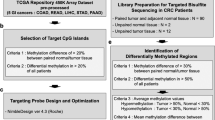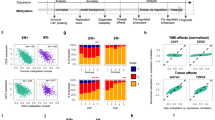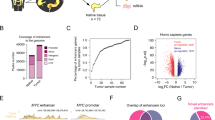Abstract
Loss of tumour suppressor gene function can occur as a result of epigenetic silencing of large chromosomal regions, referred to as long-range epigenetic silencing (LRES), and genome-wide analyses have revealed that LRES is present in many cancer types. Here we utilize Illumina Beadchip methylation array analysis to identify LRES across 800 kb of chromosome 5q31 in colorectal adenomas and carcinomas (n=34) relative to normal colonic epithelial DNA (n=6). This region encompasses 53 individual protocadherin (PCDH) genes divided among three gene clusters. Hypermethylation within these gene clusters is asynchronous; while most PCDH hypermethylation occurs early, and is apparent in adenomas, PCDHGC3 promoter methylation occurs later in the adenoma–carcinoma transition. PCDHGC3 was hypermethylated in 17/28 carcinomas (60.7%) according to methylation array analysis. Quantitative real-time reverse transcription–polymerase chain reaction showed that PCDHGC3 is the highest expressed PCDH in normal colonic epithelium, and that there was a strong reciprocal relationship between PCDHGC3 methylation and expression in carcinomas (R=−0.84). PCDH LRES patterns are reflected in colorectal tumour cell lines; adenoma cell lines are not methylated at PCDHGC3 and show abundant expression at the mRNA and protein level, while the expression is suppressed in hypermethylated carcinoma cell lines (R=−0.73). Short-interfering RNA-mediated reduction of PCDHGC3 led to a decrease of apoptosis in RG/C2 adenoma cells, and overexpression of PCDHGC3 in HCT116 cells resulted in the reduction of colony formation, consistent with tumour suppressor capabilities for PCDHGC3. Further functional analysis showed that PCDHGC3 can suppress Wnt and mammalian target of rapamycin signalling in colorectal cancer cell lines. Taken together, our data suggest that the PCDH LRES is an important tumour suppressor locus in colorectal cancer, and that PCDHGC3 may be a strong marker and driver for the adenoma–carcinoma transition.
This is a preview of subscription content, access via your institution
Access options
Subscribe to this journal
Receive 50 print issues and online access
$259.00 per year
only $5.18 per issue
Buy this article
- Purchase on Springer Link
- Instant access to full article PDF
Prices may be subject to local taxes which are calculated during checkout






Similar content being viewed by others
References
Ahuja N, Mohan AL, Li Q, Stolker JM, Herman JG, Hamilton SR et al. (1997). Association between CpG island methylation and microsatellite instability in colorectal cancer. Cancer Res 57: 3370–3374.
Ashton GH, Morton JP, Myant K, Phesse TJ, Ridgway RA, Marsh V et al. (2010). Focal adhesion kinase is required for intestinal regeneration and tumorigenesis downstream of Wnt/c-Myc signaling. Dev Cell 19: 259–269.
Bass T, Ebert M, Hammerschmidt M, Frank M . (2007). Differential expression of four protocadherin alpha and gamma clusters in the developing and adult zebrafish: DrPcdh2 gamma but not DrPcdh1 gamma is expressed in neuronal precursor cells, ependymal cells and non-neural epithelia. Dev Genes Evol 217: 337–351.
Baylin SB, Ohm JE . (2006). Epigenetic gene silencing in cancer—a mechanism for early oncogenic pathway addiction? Nat Rev Cancer 6: 107–116.
Cho KR, Vogelstein B . (1992). Genetic alterations in the adenoma–carcinoma sequence. Cancer 70: 1727–1731.
Coolen MW, Stirzaker C, Song JZ, Statham AL, Kassir Z, Moreno CS et al. (2010). Consolidation of the cancer genome into domains of repressive chromatin by long-range epigenetic silencing (LRES) reduces transcriptional plasticity. Nat Cell Biol 12: 235–246.
Cui H, Cruz-Correa M, Giardiello FM, Hutcheon DF, Kafonek DR, Brandenburg S et al. (2003). Loss of IGF2 imprinting: a potential marker of colorectal cancer risk. Science 299: 1753–1755.
Dallosso AR, Hancock AL, Szemes M, Moorwood K, Chilukamarri L, Tsai HH et al. (2009). Frequent long-range epigenetic silencing of protocadherin gene clusters on chromosome 5q31 in Wilms’ tumor. PLoS Genet 5: e1000745.
Elder DJ, Hague A, Hicks DJ, Paraskeva C . (1996). Differential growth inhibition by the aspirin metabolite salicylate in human colorectal tumor cell lines: enhanced apoptosis in carcinoma and in vitro-transformed adenoma relative to adenoma relative to adenoma cell lines. Cancer Res 56: 2273–2276.
Fearon ER . (2011). Molecular genetics of colorectal cancer. Annu Rev Pathol 6: 479–507.
Fernandez-Monreal M, Kang S, Phillips GR . (2009). Gamma-protocadherin homophilic interaction and intracellular trafficking is controlled by the cytoplasmic domain in neurons. Mol Cell Neurosci 40: 344–353.
Frigola J, Song J, Stirzaker C, Hinshelwood RA, Peinado MA, Clark SJ . (2006). Epigenetic remodeling in colorectal cancer results in coordinate gene suppression across an entire chromosome band. Nat Genet 38: 540–549.
Greenhough A, Wallam CA, Hicks DJ, Moorghen M, Williams AC, Paraskeva C . (2010). The proapoptotic BH3-only protein Bim is downregulated in a subset of colorectal cancers and is repressed by antiapoptotic COX-2/PGE(2) signalling in colorectal adenoma cells. Oncogene 29: 3398–3410.
Greenspan EJ, Jablonski MA, Rajan TV, Levine J, Belinsky GS, Rosenberg DW . (2006). Epigenetic alterations in RASSF1A in human aberrant crypt foci. Carcinogenesis 27: 1316–1322.
Gulhati P, Cai Q, Li J, Liu J, Rychahou PG, Qiu S et al. (2009). Targeted inhibition of mammalian target of rapamycin signaling inhibits tumorigenesis of colorectal cancer. Clin Cancer Res 15: 7207–7516.
Haas IG, Frank M, Veron N, Kemler R . (2005). Presenilin-dependent processing and nuclear function of gamma-protocadherins. J Biol Chem 280: 9313–9319.
Hambsch B, Grinevich V, Seeburg PH, Schwarz MK . (2005). Gamma-protocadherins, presenilin-mediated release of C-terminal fragment promotes locus expression. J Biol Chem 280: 15888–15897.
Han MH, Lin C, Meng S, Wang X . (2010). Proteomics analysis reveals overlapping functions of clustered protocadherins. Mol Cell Proteomics 9: 71–83.
Hanson HH, Kang S, Fernandez-Monreal M, Oung T, Yildirim M, Lee R et al. (2010). LC3-dependent intracellular membrane tubules induced by gamma-protocadherins A3 and B2: a role for intraluminal interactions. J Biol Chem 285: 20982–20992.
Hitchins MP, Lin VA, Buckle A, Cheong K, Halani N, Ku S et al. (2007). Epigenetic inactivation of a cluster of genes flanking MLH1 in microsatellite-unstable colorectal cancer. Cancer Res 67: 9107–9116.
Hsieh AC, Costa M, Zollo O, Davis C, Feldman ME, Testa JR et al. (2010). Genetic dissection of the oncogenic mTOR pathway reveals druggable addiction to translational control via 4EBP-eIF4E. Cancer Cell 17: 249–261.
Ibrahim AE, Arends MJ, Silva AL, Wyllie AH, Greger L, Ito Y et al. (2011). Sequential DNA methylation changes are associated with DNMT3B overexpression in colorectal neoplastic progression. Gut 60: 499–508.
Inoki K, Ouyang H, Zhu T, Lindvall C, Wang Y, Zhang X et al. (2006). TSC2 integrates Wnt and energy signals via a coordinated phosphorylation by AMPK and GSK3 to regulate cell growth. Cell 126: 955–968.
Javierre BM, Rodriguez-Ubreva J, Al-Shahrour F, Corominas M, Grana O, Ciudad L et al. (2011). Long-range epigenetic silencing associates with deregulation of Ikaros targets in colorectal cancer cells. Mol Cancer Res 9: 1139–1151.
Ji W, Hernandez R, Zhang XY, Qu GZ, Frady A, Varela M et al. (1997). DNA demethylation and pericentromeric rearrangements of chromosome. Mutat Res 379: 33–41.
Jones PA, Baylin SB . (2007). The epigenomics of cancer. Cell 128: 683–692.
Jung CH, Ro SH, Cao J, Otto NM, Kim DH . (2010). mTOR regulation of autophagy. FEBS Lett 584: 1287–1295.
Klaus A, Birchmeier W . (2008). Wnt signalling and its impact on development and cancer. Nat Rev Cancer 8: 387–398.
Klionsky DJ, Abeliovich H, Agostinis P, Agrawal DK, Aliev G, Askew DS et al. (2008). Guidelines for the use and interpretation of assays for monitoring autophagy in higher eukaryotes. Autophagy 4: 151–175.
Kobayashi Y, Absher DM, Gulzar ZG, Young SR, McKenney JK, Peehl DM et al. (2011). DNA methylation profiling reveals novel biomarkers and important roles for DNA methyltransferases in prostate cancer. Genome Res 21: 1017–1027.
Lin C, Meng S, Zhu T, Wang X . (2010). PDCD10/CCM3 acts downstream of /{gamma/}-protocadherins to regulate neuronal survival. J Biol Chem 285: 41675–41685.
Lind GE, Danielsen SA, Ahlquist T, Merok MA, Andresen K, Skotheim RI et al. (2011). Identification of an epigenetic biomarker panel with high sensitivity and specificity for colorectal cancer and adenomas. Mol Cancer 10: 85.
Matsuzaki K, Deng G, Tanaka H, Kakar S, Miura S, Kim YS . (2005). The relationship between global methylation level, loss of heterozygosity, and microsatellite instability in sporadic colorectal cancer. Clin Cancer Res 11: 8564–8569.
Miyoshi Y, Nagase H, Ando H, Horii A, Ichii S, Nakatsuru S et al. (1992). Somatic mutations of the APC gene in colorectal tumors: mutation cluster region in the APC gene. Hum Mol Genet 1: 229–233.
Novak P, Jensen T, Oshiro MM, Watts GS, Kim CJ, Futscher BW . (2008). Agglomerative epigenetic aberrations are a common event in human breast cancer. Cancer Res 68: 8616–8625.
Novak P, Jensen TJ, Garbe JC, Stampfer MR, Futscher BW . (2009). Stepwise DNA methylation changes are linked to escape from defined proliferation barriers and mammary epithelial cell immortalization. Cancer Res 69: 5251–5258.
O'Leary R, Reilly J, Hanson HH, Kang S, Lou N, Phillips GR . (2011). A variable cytoplasmic domain segment is necessary for gamma-protocadherin trafficking and tubulation in the endosome/lysosome pathway. Mol Biol Cell 22: 4362–4372.
Obata S, Sago H, Mori N, Rochelle JM, Seldin MF, Davidson M et al. (1995). Protocadherin Pcdh2 shows properties similar to, but distinct from, those of classical cadherins. J Cell Sci 108: 3765–3773.
Oster B, Thorsen K, Lamy P, Wojdacz TK, Hansen LL, Birkenkamp-Demtroder K et al. (2011). Identification and validation of highly frequent CpG island hypermethylation in colorectal adenomas and carcinomas. Int J Cancer 129: 2855–2866.
Paraskeva C, Finerty S, Mountford RA, Powell SC . (1989). Specific cytogenetic abnormalities in two new human colorectal adenoma-derived epithelial cell lines. Cancer Res 49: 1282–1286.
Paz MF, Fraga MF, Avila S, Guo M, Pollan M, Herman JG et al. (2003). A systematic profile of DNA methylation in human cancer cell lines. Cancer Res 63: 1114–1121.
Phelps RA, Chidester S, Dehghanizadeh S, Phelps J, Sandoval IT, Rai K et al. (2009). A two-step model for colon adenoma initiation and progression caused by APC loss. Cell 137: 623–634.
Pino MS, Chung DC . (2010). The chromosomal instability pathway in colon cancer. Gastroenterology 138: 2059–2072.
Powell SM, Zilz N, Beazer-Barclay Y, Bryan TM, Hamilton SR, Thibodeau SN et al. (1992). APC mutations occur early during colorectal tumorigenesis. Nature 359: 235–237.
Rauch T, Wang Z, Zhang X, Zhong X, Wu X, Lau SK et al. (2007). Homeobox gene methylation in lung cancer studied by genome-wide analysis with a microarray-based methylated CpG island recovery assay. Proc Natl Acad Sci USA 104: 5527–5532.
Rhee I, Bachman KE, Park BH, Jair KW, Yen RW, Schuebel KE et al. (2002). DNMT1 and DNMT3b cooperate to silence genes in human cancer cells. Nature 416: 552–556.
Schalm SS, Ballif BA, Buchanan SM, Phillips GR, Maniatis T . (2010). Phosphorylation of protocadherin proteins by the receptor tyrosine kinase Ret. Proc Natl Acad Sci USA 107: 13894–13899.
Schmidt WM, Sedivy R, Forstner B, Steger GG, Zochbauer-Muller S, Mader RM . (2007). Progressive up-regulation of genes encoding DNA methyltransferases in the colorectal adenoma-carcinoma sequence. Mol Carcinogen 46: 766–772.
Schreiner D, Weiner JA . (2010). Combinatorial homophilic interaction between gamma-protocadherin multimers greatly expands the molecular diversity of cell adhesion. Proc Natl Acad Sci USA 107: 14893–14898.
Smith LT, Lin M, Brena RM, Lang JC, Schuller DE, Otterson GA et al. (2006). Epigenetic regulation of the tumor suppressor gene TCF21 on 6q23–q24 in lung and head and neck cancer. Proc Natl Acad Sci USA 103: 982–987.
Suzuki H, Watkins DN, Jair KW, Schuebel KE, Markowitz SD, Chen WD et al. (2004). Epigenetic inactivation of SFRP genes allows constitutive WNT signaling in colorectal cancer. Nat Genet 36: 417–422.
Wang XZ, Chen J, Lu YY, Meng SX, Han MH, Lin CY . (2009). Alpha- and gamma-protocadherins negatively regulate PYK. J Biol Chem 284: 2880–2890.
Weisenberger DJ, Siegmund KD, Campan M, Young J, Long TI, Faasse MA et al. (2006). CpG island methylator phenotype underlies sporadic microsatellite instability and is tightly associated with BRAF mutation in colorectal cancer. Nat Genet 38: 787–793.
Wong JJ, Hawkins NJ, Ward RL, Hitchins MP . (2011). Methylation of the 3p22 region encompassing MLH1 is representative of the CpG island methylator phenotype in colorectal cancer. Mod Pathol 24: 396–411.
Wood LD, Parsons DW, Jones S, Lin J, Sjoblom T, Leary RJ et al. (2007). The genomic landscapes of human breast and colorectal cancers. Science 318: 1108–1113.
Yagi K, Akagi K, Hayashi H, Nagae G, Tsuji S, Isagawa T et al. (2010). Three DNA methylation epigenotypes in human colorectal cancer. Clin Cancer Res 16: 21–33.
Ying J, Li H, Seng TJ, Langford C, Srivastava G, Tsao SW et al. (2006). Functional epigenetics identifies a protocadherin PCDH10 as a candidate tumor suppressor for nasopharyngeal, esophageal and multiple other carcinomas with frequent methylation. Oncogene 25: 1070–1080.
Acknowledgements
This work was supported by a Wellcome Trust VIP award, Cancer Research UK Grants C20791/A12743 and C19/A11975, Kidney Research UK and the Cancer and Leukaemia in Childhood—Sargent Trust. Further funding was from the John and Birthe Meyer Foundation, the Lundbeck Foundation and The European Union’s Seventh Framework Program (SYSCOL HEALTHF5-2010-258236). We thank Dr Greg Phillips for the antibody towards the γ-PCDH constant domain, Professor Moon for reporter plasmids and Professor Vogelstein for mutant HCT116 cells. We also thank Dr Andrea Buda, Dr Katy Petherick, Dr Zsombor Melegh, Dr Newton Wong and Professor Andrew Silver for helpful discussions and comments.
Author information
Authors and Affiliations
Corresponding authors
Ethics declarations
Competing interests
The authors declare no conflict of interest.
Additional information
Supplementary Information accompanies the paper on the Oncogene website
Supplementary information
Rights and permissions
About this article
Cite this article
Dallosso, A., Øster, B., Greenhough, A. et al. Long-range epigenetic silencing of chromosome 5q31 protocadherins is involved in early and late stages of colorectal tumorigenesis through modulation of oncogenic pathways. Oncogene 31, 4409–4419 (2012). https://doi.org/10.1038/onc.2011.609
Received:
Revised:
Accepted:
Published:
Issue Date:
DOI: https://doi.org/10.1038/onc.2011.609
Keywords
This article is cited by
-
miR-185-5p May Modulate the Chemosensitivity of LUSC to Cisplatin via Targeting PCDHA11: Multi-omics Analysis and Experimental Validation
Biochemical Genetics (2024)
-
Genome-wide analysis toward the epigenetic aetiology of myelodysplastic syndrome disease progression and pharmacoepigenomic basis of hypomethylating agents drug treatment response
Human Genomics (2023)
-
Epigenetically regulated PCDHB15 impairs aggressiveness of metastatic melanoma cells
Clinical Epigenetics (2022)
-
Long noncoding RNA SOX2OT promotes pancreatic cancer cell migration and invasion through destabilizing FUS protein via ubiquitination
Cell Death Discovery (2021)
-
PCDHGA9 represses epithelial-mesenchymal transition and metastatic potential in gastric cancer cells by reducing β-catenin transcriptional activity
Cell Death & Disease (2020)



